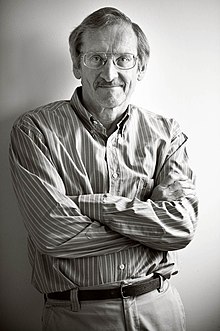Paul Claes

Paul Claes (born 30 October 1943) is a Flemish scholar, writer, poet and translator.
Biography
[edit]Born in Leuven, Claes graduated in classical literature and Germanic philology (Dutch and English). He obtained a PhD in 1981, with a dissertation De mot zit in de mythe on references to classical texts in the works of Hugo Claus. He worked at the Katholieke Universiteit Leuven and the Catholic University of Nijmegen.
He wrote the script for Reynaert de Vos (1973-1974), a satirical newspaper comic based on Reynard the Fox, drawn by hugOKÉ. [1]
Claes made his debut as a poet in 1983 with sonnets in De zonen van de zon. His translation of T. S. Eliot's The Waste Land (2007) includes a comprehensive commentary and a new interpretation. La clef des Illuminations (2008) is a new interpretation of Arthur Rimbaud's masterpiece. Concatenatio Catulliana (2002) proposes a new theory about the arrangement of Catullus's Carmina.
- Het netwerk en de nevelvlek (1979)
- De zonen van de zon (1983)
- Claus-reading (1984)
- De mot zit in de mythe (1984)
- Hans Favery. Een (de)constructie (1985)
- De Kwadratuur van de Onyx (1986)
- Claus quadrifrons (1987)
- Echo's echo's. De kunst van de allusie (1988)
- Rebis (1989)
- Het laatste boek (1992)
- De Sater (1993)
- Gezelle gelezen (1993 [i.e. 1992])
- Embleem (1994)
- Mimicry (1994)
- Raadsels van Rilke (1995)
- De zoon van de Panter (1996)
- De phoenix (1998)
- De gulden tak (2000)
- Glans (2000)
- De kameleon (2001)
- Het Hart van de Schorpioen (2002)
- De Lezer (2003)
- Lily (2003)
- Sfinx (2004)
- Psyche (2006)
- Plastic Love (2013)
- De haas en de regenboog (2016)
- Ouroboros (2023)
Awards
[edit]- 1984 - Prijs voor de Kunstkritiek
- 1985 - Literaire Prijs van de stad Antwerpen
- 1991 - Driejaarlijkse Belgische Staatsprijs voor het essay
- 1996 - Martinus Nijhoff prijs
- 2002 - Multatuli Prize
See also
[edit]Sources
[edit]- Paul Claes (in Dutch)
- Paul Claes (in Dutch)
- 1943 births
- Living people
- Flemish writers
- Belgian comics writers
- Belgian translators
- Dutch–English translators
- English–Dutch translators
- French–Dutch translators
- Latin–Dutch translators
- Translators of Ancient Greek texts
- Writers from Leuven
- KU Leuven alumni
- Academic staff of KU Leuven
- Academic staff of Radboud University Nijmegen
- Belgian writer stubs
